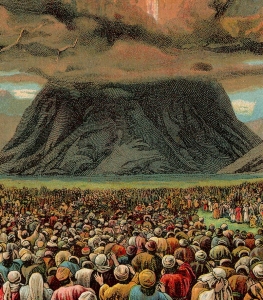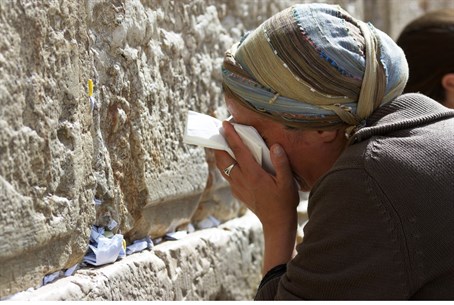
As we move through Seder night, we drink the four cups of wine and we relate to the elements on the Seder plate, we are not usually cognizant of the fact that both these central components of Seder night, actually represent the four-letter Name of God, YHVH
Pharaoh said, “Who is YHVH that I should listen to His voice? “
Actually, Pharaoh was cognizant of God acting through nature in the name of ELOKIM because that is how he acknowledged God to Joseph. And even if we are talking about a different Pharaoh, one who did not know Joseph, nevertheless he would have heard of the story. But YHVH was unknown to Pharoah.
It is when God makes himself known to the Children of Israel through the Name YHVH that the four expressions of redemption occur.
2. God spoke to Moses, and He said to him, “I am YHVH 3. I appeared to Abraham, to Isaac, and to Jacob with [the name] El Shaddai [Almighty God], but [with] My name YHVH, I did not become known to them. 4. And also, I established My covenant with them to give them the land of Canaan, the land of their sojournings in which they sojourned. 5. And also, I heard the moans of the children of Israel, whom the Egyptians are holding in bondage, and I remembered My covenant. 6. Therefore, say to the children of Israel, ‘I am YHVH, and I will take you out from under the burdens of the Egyptians, and I will save you from their labor, and I will redeem you with an outstretched arm and with great judgments. 7. And I will take you to Me as a people, and I will be a God to you, and you will know that I am the Lord your God, Who has brought you out from under the burdens of the Egyptians. 8. I will bring you to the land, concerning which I raised My hand to give to Abraham, to Isaac, and to Jacob, and I will give it to you as a heritage; I am YHVH.’ “
Exodus 6: 2-8
What is the significance of this new name? This name, YHVH, which we simply call HaShem, meaning the Name, is the name of God that is compassion, forgiveness, and mercy. Even though we, the Children of Israel had sunk down to the forty-ninth level of uncleanness, nevertheless, HaShem had mercy on us and took us out. Then, as He does now.
Just as we were exiled in the historical Egypt, we all suffer different aspects of exile wherein we are in exile from our inner selves. Connecting with the name of God, HaShem helps us put our trust in God, helps us forgive ourselves and others and helps trust that HaShem will release us from the bondage of our inner Pharoah, as indeed He does.
As we say on Seder night,
In every generation a person needs to feel as if he or she is taken out of Egypt.
Haggadah of Pesach
This podcast comes from an edited class given on the inner meanings of Seder night. It is dedicated to the ilui nishmat of Feiga bat Rivka z”l and Aharon and Sara Kotler z”l



 Have you ever wondered what standing at Mount Sinai felt like? Tradition teaches that all the souls of the Jewish people, past, present and future stood together and heard the voice of God. So what did we actually experience?
The Torah states:
“And all the people saw the voices and the torches, the sound of the shofar, and the smoking mountain, and the people saw and trembled; so they stood from afar.”
The Zohar picks up on this statement:
” Surely the Torah should have said that the people heard the voices. However, we learn that these voices were engraved in the darkness, the cloud, and the fog, and appeared within them. The voices appeared in form just as an actual body appears. It was from this vision that we saw that we were illuminated with the highest illumination and we knew what no other subsequent generation knew.”
When we received God’s voice, face to face, at Mount Sinai it changed us and the world forever.
This podcast is dedicated for a refuah shelemah , a perfect healing for Virginia Veracruz, the daughter of Mary Salas, and also in loving memory of Feiga bat Shmuel and Rivka and for an ilui nishamatah, the elevation of her soul.
The material for this podcast is translated from the Zohar Perush haSulam ma’amar, vkol ha’am roim hakolot.
Have you ever wondered what standing at Mount Sinai felt like? Tradition teaches that all the souls of the Jewish people, past, present and future stood together and heard the voice of God. So what did we actually experience?
The Torah states:
“And all the people saw the voices and the torches, the sound of the shofar, and the smoking mountain, and the people saw and trembled; so they stood from afar.”
The Zohar picks up on this statement:
” Surely the Torah should have said that the people heard the voices. However, we learn that these voices were engraved in the darkness, the cloud, and the fog, and appeared within them. The voices appeared in form just as an actual body appears. It was from this vision that we saw that we were illuminated with the highest illumination and we knew what no other subsequent generation knew.”
When we received God’s voice, face to face, at Mount Sinai it changed us and the world forever.
This podcast is dedicated for a refuah shelemah , a perfect healing for Virginia Veracruz, the daughter of Mary Salas, and also in loving memory of Feiga bat Shmuel and Rivka and for an ilui nishamatah, the elevation of her soul.
The material for this podcast is translated from the Zohar Perush haSulam ma’amar, vkol ha’am roim hakolot.








